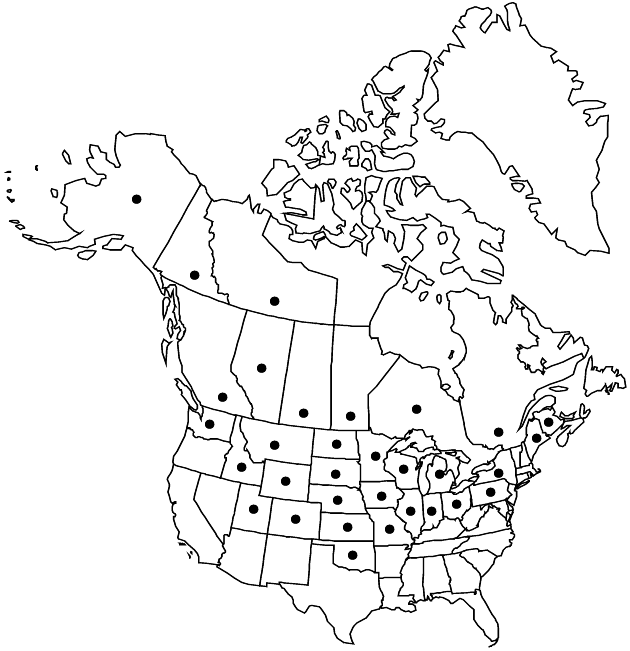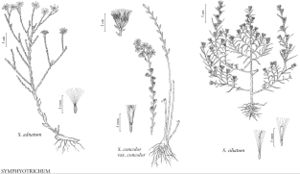Symphyotrichum ciliatum
Phytologia 77: 277. 1995.
Annuals, 7–70+ cm. Stems 1, ascending to erect (straight), bluish yellowish green, often red-tinged, ± succulent, glabrous. Leaves bluish (green) thin, sometimes ± fleshy, margins usually entire, sometimes serrulate, strigoso-ciliate to scabrous, midribs conspicuous, apices acute to short-acuminate, faces glabrous; basal withering by flowering, petiolate, blades spatulate, 15–205 × 1.5–9 mm, bases attenuate; proximal cauline usually withering by flowering (with clusters of smaller leaves in axils, often elongating into branches); cauline sessile, blades linear-oblanceolate, (10–)30–80(–150) × 1–4(–9) mm, gradually reduced distally, bases slightly dilated and clasping to rounded. Heads (disciform) in ± dense, narrow to pyramidal, paniculiform to racemiform arrays, branches decumbent (proximal) to ascending (distal); peduncles 0–1 cm, glabrous, bracts linear-lanceolate to linear, crowding heads. Involucres narrowly campanulate, 5–7(–11) mm. Phyllaries in 3–4 series, loose, linear to narrowly oblanceolate, subequal or outer sometimes longer, bases scarious, margins narrowly scarious proximally (outer), scabrous, green zones foliaceous (outer and mid) to lanceolate (inner), apices acute (rarely obtuse), mucronulate, faces glabrous. Ray florets 0. Pistillate florets 75–95+ in 4–5+ series; laminae 0 (corolla tubes ± 2 mm, shorter than style branches). Disc florets ± 14; corollas whitish turning pink, ± ampliate, tubes slender, longer than narrowly funnelform limbs, 3.5–5 mm, lobes narrowly triangular, ± 0.2 mm. Cypselae purple or grayish with purple streaks, obovoid to oblong-obovoid, ± compressed, 1.5–2.5 mm, 2–4-nerved (faint), faces hirsuto-strigose; pappi white or pinkish, 4–6 mm. 2n = 14.
Phenology: Flowering Aug–Oct.
Habitat: Moist, brackish soils, prairies, steppes, salt marshes (Hudson Bay), summer-receding prairie ponds, open grounds in loess hills, irrigation channels, winter-salted highways, railroads, waste grounds
Elevation: 0–2000+ m
Distribution

Alta., B.C., Man., N.B., N.W.T., Ont., Que., Sask., Yukon, Alaska, Colo., Idaho, Ill., Ind., Iowa, Kans., Maine, Mich., Minn., Mo., Mont., Nebr., N.Y., N.Dak., Ohio, Okla., Pa., S.Dak., Utah, Wash., Wis., Wyo., n Eurasia (w to Rumania).
Discussion
Symphyotrichum ciliatum is introduced east of the Prairies in winter-salted wastegrounds and roadsides; it is native in northern Ontario, however, in the saltmarshes of the western shore of James Bay. It is native to the steppes of Eurasia, westward to Rumania.
Selected References
None.
